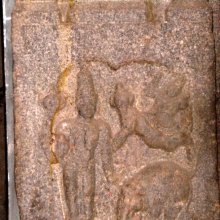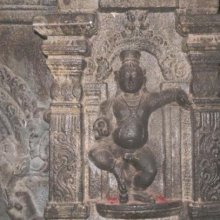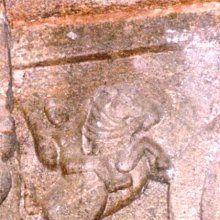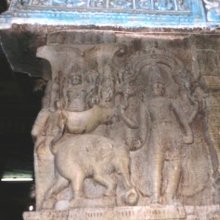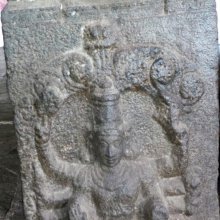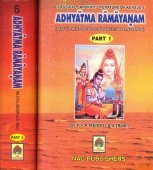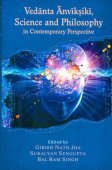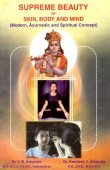Moksha, Mokṣa, Moksa, Mokṣā: 42 definitions
Introduction:
Moksha means something in Buddhism, Pali, Hinduism, Sanskrit, Jainism, Prakrit, Marathi, Hindi. If you want to know the exact meaning, history, etymology or English translation of this term then check out the descriptions on this page. Add your comment or reference to a book if you want to contribute to this summary article.
The Sanskrit terms Mokṣa and Mokṣā can be transliterated into English as Moksa or Moksha, using the IAST transliteration scheme (?).
Images (photo gallery)
(+6 more images available)
In Hinduism
Purana and Itihasa (epic history)
Source: archive.org: Puranic Encyclopedia1) Mokṣa (मोक्ष).—One of the seven divisions of the island of Plakṣa. The seven divisions are Śiva, Yavasa, Subhadra, Śānta, Mokṣa, Amṛta and Abhaya. (5th Skandha, Bhāgavata).
2) Mokṣa (मोक्ष).—* Mokṣa means liberation and is generally meant to convey the meaning of the deliverance of the soul from recurring births. The Jīvātmā enshrined in the body has the delusion that it enjoys or suffers happiness or woe. In truth it neither suffers nor enjoys anything. It is detached from all. It is the Supreme Being (Parabrahman). When Jīvātmā deserts its woes it gets mokṣa i.e. Jīvātmā gets merged with Paramātmā. When once Jīvātmā merges with Paramātmā, Jīvātmā is devoid of happiness or woes. It need not be enshrined in any body. A Jīvātmā getting released from one body joins another new body and thus a Jīvātmā in succession enters thousands of bodies and each time without knowing the absolute Truth laments over its woes. In the words of a Ṛṣi it is explained thus: "Jīvātmā, which is bliss in itself living in births after births searches for bliss elsewhere just as a person wearing a golden necklace round his neck searches for the same elsewhere." The passage of Jīvātmā from one birth to another and the bodies that enshrine it each time constitutes the worldly life. When once a Jīvātmā thus involved in Saṃsāra (mundane existence) gets real knowledge, the knowledge that Jīvātmā and Paramātmā are one and the same, then that Jīvātmā gets final emancipation, liberation from recurring births. It merges with Brahman. This is called Mokṣa.
2) *) Jīvātmā = The individual soul enshrined in the human body imparting to it life, motion and sensation as opposed to Paramātmā. Paramātmā = The Supreme spirit or Brahman Saṃsāra = The circuit of life consisting of births and rebirths with sufferings and enjoyments of woes and happiness.
Source: Cologne Digital Sanskrit Dictionaries: The Purana IndexMokṣa (मोक्ष).—No bondage; three-fold mokṣa; renunciation by knowledge, diminution of rāga and loss of tṛṣṇā;1 dharma of;2 is yogasiddhi;3 salvation, attained at the sacred Benares;4 oneness with Brahmam.5
- 1) Brahmāṇḍa-purāṇa IV. 3. 55; Vāyu-purāṇa 23. 81; 102. 76, 78, 80, 93.
- 2) Brahmāṇḍa-purāṇa III. 10. 116.
- 3) Ib. IV. 36. 52; 44. 108.
- 4) Matsya-purāṇa 180. 52; 183. 36-37; 185. 15; 193. 40.
- 5) Vāyu-purāṇa 104. 94.
Mokṣa (मोक्ष) refers to “release from the bondage of the mundane life” according to the Purāṇas.—The word mokṣa means release (mukti) and it denotes release from the bondage of the mundane life and the repeated cycles of birth and death. [...] The Purāṇas which are dedicated to the glorification of a particular deity uphold that emancipation consists in reaching the blessed region inhabited by that deity.

The Purana (पुराण, purāṇas) refers to Sanskrit literature preserving ancient India’s vast cultural history, including historical legends, religious ceremonies, various arts and sciences. The eighteen mahapuranas total over 400,000 shlokas (metrical couplets) and date to at least several centuries BCE.
Pancaratra (worship of Nārāyaṇa)
Source: Wisdom Library: PāñcarātraMokṣa (मोक्ष) refers to an aspect of nṛsiṃha (‘man-lion’), according to the Vihagendra-saṃhitā 4.17, which mentions seventy-four forms (inlcuding twenty forms of vyūha). He is also known as Mokṣanṛsiṃha or Mokṣanarasiṃha. Nṛsiṃha is a Tantric deity and refers to the furious (ugra) incarnation of Viṣṇu.
The 15th-century Vihagendra-saṃhīta is a canonical text of the Pāñcarātra corpus and, in twenty-four chapters, deals primarely with meditation on mantras and sacrificial oblations.
Source: Shodhganga: Kasyapa Samhita—Text on Visha Chikitsa (p)Mokṣa (मोक्ष) refers to “deliverance”, as taught by the Pāñcarātra division of the Vaiṣṇava Āgamas.—The Āgamas reiterate that it is the basic duty of man to be kind and hospitable to all beings. They have successfully erased the archaic view that God was the prerogative of the intelligentsia. They declare that He is everywhere and in every being, and has given the common man, the two easy and simple means of bhakti (devotion) and prapatti (self-surrender) to God to relieve him from the pressures of life and death and lead him to mokṣa or deliverance.

Pancaratra (पाञ्चरात्र, pāñcarātra) represents a tradition of Hinduism where Narayana is revered and worshipped. Closeley related to Vaishnavism, the Pancaratra literature includes various Agamas and tantras incorporating many Vaishnava philosophies.
Mīmāṃsā (school of philosophy)
Source: Srimatham: Mīmāṃsa: The Study of Hindu ExegesisMokṣa (मोक्ष, “liberation”).—Mīmāṃsā suggests that liberation (mokṣa) cannot be achieved by Right Knowledge alone, for the Self must first exhaust its negative and positive potentialities gained through action (karma), as a seed fulfils itself through growth. No amount of contemplation (dhyāna) will enable one to arrive at the ultimate goal of human destiny; therefore, the emphasis is on the ethical aspect of life rather than on the rational. All arguments to support this thesis are based on the premise that the Self by definition is eternal. The actions to be done (karma) and the rewards (phala) that follow are enjoined in the Veda and interpreted by Mīmāṃsā.

Mimamsa (मीमांसा, mīmāṃsā) refers to one of the six orthodox Hindu schools of philosophy, emphasizing the nature of dharma and the philosophy of language. The literature in this school is also known for its in-depth study of ritual actions and social duties.
Vaishnavism (Vaishava dharma)
Source: Devotees Vaishnavas: Śrī Garga SaṃhitāMokṣā (मोक्षा) refers to the second of twenty-six ekādaśīs according to the Garga-saṃhitā 4.8.9. Accordingly, “to attain Lord Kṛṣṇa’s mercy you should follow the vow of fasting on ekādaśī. In that way You will make Lord Kṛṣṇa into your submissive servant. Of this there is no doubt”. A person who chants the names of these twenty-six ekādaśīs (e.g., Mokṣā) attains the result of following ekādaśī for one year.
Source: Pure Bhakti: Bhagavad-gita (4th edition)Mokṣa (मोक्ष) refers to “liberation from material bondage”. (cf. Glossary page from Śrīmad-Bhagavad-Gītā).
Source: Pure Bhakti: Brhad BhagavatamrtamMokṣa (मोक्ष) refers to:—Impersonal liberation. (cf. Glossary page from Śrī Bṛhad-bhāgavatāmṛta).

Vaishnava (वैष्णव, vaiṣṇava) or vaishnavism (vaiṣṇavism) represents a tradition of Hinduism worshipping Vishnu as the supreme Lord. Similar to the Shaktism and Shaivism traditions, Vaishnavism also developed as an individual movement, famous for its exposition of the dashavatara (‘ten avatars of Vishnu’).
Jyotisha (astronomy and astrology)
Source: Wisdom Library: Brihat Samhita by VarahamihiraMokṣa (मोक्ष) refers to the “termination” of solar and lunar eclipses, according to the Bṛhatsaṃhitā (chapter 5), an encyclopedic Sanskrit work written by Varāhamihira mainly focusing on the science of ancient Indian astronomy astronomy (Jyotiṣa).
There are ten types of terminations (mokṣa) defined for lunar and solar eclipses:
- dakṣiṇahanu,
- vāmahanu,
- dakṣiṇakukṣi,
- vāmakukṣi,
- dakṣiṇapāyu,
- vāmapāyu,
- sañchardana,
- jaraṇa,
- madhvavidaraṇa,
- antavidaraṇa.
Mokṣa (मोक्ष).—The separation of the eclipsed body after an eclipse, the last contact, or the end of the eclipse. Note: Mokṣa is a Sanskrit technical term used in ancient Indian sciences such as Astronomy, Mathematics and Geometry.

Jyotisha (ज्योतिष, jyotiṣa or jyotish) refers to ‘astronomy’ or “Vedic astrology” and represents the fifth of the six Vedangas (additional sciences to be studied along with the Vedas). Jyotisha concerns itself with the study and prediction of the movements of celestial bodies, in order to calculate the auspicious time for rituals and ceremonies.
Shaivism (Shaiva philosophy)
Source: Shodhganga: Mantra-sādhana: Chapter One of the KakṣapuṭatantraMokṣa (मोक्ष, “liberation”) is accomplished by performing mantrasādhana (preparatory procedures) beginning with japamālā using a rosary bead made of lotus seed beads, according to the Kakṣapuṭatantra verse 1.43. Accordingly, “for the accomplishment of all kinds of kāma (love), one should recite a mantra using a rosary made of rudrākṣa beads. For the accomplishment of dharma (virtue), artha (wealth), kāma (love), and mokṣa (liberation), one should recite a mantra using a rosary made of lotus seed beads”.
Source: Brill: Śaivism and the Tantric TraditionsMokṣa (मोक्ष) refers to “(the attainment of) liberation”, according to the Guhyasūtra chapter 9.—Accordingly, “[...] [The Lord spoke]:—[...] He will be released from [the retributive force of] major transgressions; and he will attain low siddhis after two months, middling siddhis after half a year and high siddhis after a year; he will attain power over the spell. The ability to make himself atomic, along with the others [of the Yogic powers], will arise. He will take pleasure in the company of siddhas. He will attain the wishes he desires; if he is without desires, he will attain liberation (mokṣa). [...]”.

Shaiva (शैव, śaiva) or Shaivism (śaivism) represents a tradition of Hinduism worshiping Shiva as the supreme being. Closely related to Shaktism, Shaiva literature includes a range of scriptures, including Tantras, while the root of this tradition may be traced back to the ancient Vedas.
Nyaya (school of philosophy)
Source: Shodhganga: A study of Nyāya-vaiśeṣika categoriesMokṣa (मोक्ष, “liberation”).—According to Vātsyāyana, mokṣa or apavarga should consist of complete cessation of the specific qualities of the self (cf. Nyāyabhāṣya). Śrīdhara, defines mokṣa as the cessation of all the special qualities of the self and the attainment of its natural state. The Nyāya system gives a knowledge of truth for the understanding of the summum bonum of life. It is stated in this system that liberation means absolute freedom from all pain and suffering.
According to Vātsyāyana, liberation is the supreme condition of the soul. It is a state where there is no fear, which is free from decay and change, where there is no death and so on. (cf. Nyāyabhāṣya on Nyāyasūtra, 1.1.22) Śrīdhara holds that the knowledge of reality and the performance of duties are necessary for liberation. It is produced from knowledge. Udayana also maintains the same view on liberation.

Nyaya (न्याय, nyaya) refers to a school of Hindu philosophy (astika), drawing its subject-matter from the Upanishads. The Nyaya philosophy is known for its theories on logic, methodology and epistemology, however, it is closely related with Vaisheshika in terms of metaphysics.
Vedanta (school of philosophy)
Source: academia.edu: Religious Inclusivism in the Writings of an Early Modern Sanskrit Intellectual (vedanta)Mokṣa (मोक्ष) refers to “genuine liberation”.—While he [Śaṅkara] accepts that different forms of devotion or meditation (upāsanā) can legitimately be relied upon in the preliminary stages of one’s sādhana, ultimately it is only the Brahman-knowledge arising from the thorough study of śruti that leads to genuine liberation (mokṣa). Independent human reasoning (śuṣkatarka) or experience (anubhava) alone are not conducive to liberation. Therefore, those religious traditions that claim to be based on the inspiration of omniscient founders and/or on extra-Vedic revelations cannot be soteriologically-valid means of liberation.

Vedanta (वेदान्त, vedānta) refers to a school of orthodox Hindu philosophy (astika), drawing its subject-matter from the Upanishads. There are a number of sub-schools of Vedanta, however all of them expound on the basic teaching of the ultimate reality (brahman) and liberation (moksha) of the individual soul (atman).
Ayurveda (science of life)
Source: gurumukhi.ru: Ayurveda glossary of termsMokṣa (मोक्ष):—Salvation: liberation, ceaseation from worldly existence or transmigration, the fourth mansion to achieve the goal of life

Āyurveda (आयुर्वेद, ayurveda) is a branch of Indian science dealing with medicine, herbalism, taxology, anatomy, surgery, alchemy and related topics. Traditional practice of Āyurveda in ancient India dates back to at least the first millenium BC. Literature is commonly written in Sanskrit using various poetic metres.
Shaktism (Shakta philosophy)
Source: Google Books: ManthanabhairavatantramMokṣa (मोक्ष) refers to “liberation”, according to the Manthānabhairavatantra, a vast sprawling work that belongs to a corpus of Tantric texts concerned with the worship of the goddess Kubjikā.—Accordingly, “[...] Liberation [i.e., mokṣa] is the plane beyond (the differentiated) energies (kalātītapada). One should contemplate it constantly at the end of power (śaktyanta, that is, the Transmental). (The reality) beyond being (bhāvātīta) is incomparable. It is the great ocean within the End of the Twelve. It is taught to be the Western Tradition, the House that is said to be the City of the Moon (Candrapura). [...]”.
Source: Google books: Genesis and Development of Tantra (Shaktism)Mokṣa (मोक्ष, “final release”) refers to one of the various Siddhis (“supernatural powers”) according to the Siddhayogeśvarīmata: an ancient Sanskrit text devoted to cults of Goddesses as the Vidyāpīṭha or Vidyā Corpus.—Although Vedic rituals were a reliable way for the people of ancient India to fulfill their objectives, Tantric rites too claim to bring about the attainment of wishes. [...] In the Siddhayogeśvarīmata, the objectives of the rites are classified as siddhis [e.g., final release (mokṣa)]. They belong to the category of supernatural phenomena and seem to be considerably different from the types of wish people expected to gain from the Vedic rituals that still remained within the sphere of everyday life.

Shakta (शाक्त, śākta) or Shaktism (śāktism) represents a tradition of Hinduism where the Goddess (Devi) is revered and worshipped. Shakta literature includes a range of scriptures, including various Agamas and Tantras, although its roots may be traced back to the Vedas.
Sports, Arts and Entertainment (wordly enjoyments)
Source: archive.org: Syainika Sastra of Rudradeva with English Translation (art)1) Mokṣa (मोक्ष) refers to the “liberation” (of the soul), according to the Śyainika-śāstra: a Sanskrit treatise dealing with the divisions and benefits of Hunting and Hawking, written by Rājā Rudradeva (or Candradeva) in possibly the 13th century.—Accordingly, “[...] The avoidance of all sorts of activities leads only to the liberation (mokṣa) of the soul. But the performance of the duties prescribed for one’s own caste, leads to the attainment of the three other objects of life. That sort of avoidance, however, should be practised with respect to speech and the actions of the body and the mind, which leads to Brahma beyond the reach of speech. [...]”.
2) Mokṣa (मोक्ष) refers to the “hurling (of a trident)”, (during hunting), according to the Śyainika-śāstra.—Accordingly, “Hunting by means of artifice (kālyā) is of four kinds [...]. (a) Bahukarṇikā is that in which deer are hunted by the hurling of a trident (trikīrṇa-mokṣa) or a similar weapon by two or three persons standing to the windward and shouting at the top of their voices”.
3) Mokṣa (मोक्ष) refers to “unfastening (the ties)” (of dogs), according to the Śyainika-śāstra.—Accordingly, “Hunting by packs of dogs is that in which dogs are let loose at hares and other animals in arid tracts. [...] From an open space experts in unfastening (mokṣa) ties, let loose their dogs on the prey twice or thrice and success follows. [...]”.

This section covers the skills and profiencies of the Kalas (“performing arts”) and Shastras (“sciences”) involving ancient Indian traditions of sports, games, arts, entertainment, love-making and other means of wordly enjoyments. Traditionally these topics were dealt with in Sanskrit treatises explaing the philosophy and the justification of enjoying the pleasures of the senses.
General definition (in Hinduism)
Source: WikiPedia: HinduismIn Indian religions, moksha (mokṣa; 'liberation'), or mukti ('release') is the liberation from samsara, the cycle of death and rebirth. This liberation can be attained while one is on earth (jivanmukti) or eschatologically (karmamukti). Moksha is attained by disidentification with the body and mind, which are temporary and subject to change, and realisation of our true identity.
"Moksha" means "mukti", "eternal freedom from social and natural programming". Moksha and mukti are both from the root muc "to let loose, let go".
Source: Shodhganga: A study of Nyāya-vaiśeṣika categories (h)Mokṣa (मोक्ष, “liberation”) has the most important place in Indian Philosophy. It is accepted in many schools. Mokṣa is considered to be the highest ideal and end of human life. So, the Indian Philosophical systems are called to be mokṣa-sāśtras. S.N. Dasgupta says that “The doctrine of mukti and karma are the two certain principles which Hindu Philosophy could not deny even in its highest soarings. The notion of mukti is in fact the essence through which all systems of Indian Philosophy revolve”.
The human body with the sense organs feels undesirable, unpleasant, painful feelings. Therefore, in liberation (mokṣa) soul becomes released from the body and the sense-organs. It leaves both painful and pleasurable experiences. Moreover, it ceases to have any experience or consciousness. “So in liberation the self exists as a pure substance free from all connection with the body, neither suffering pain, nor enjoying pleasure, nor having consciousness even.” Liberation (mokṣa) may be considered as the state of good sleep, as a state of release from some disease, from some bodily or mental injury. As a whole, liberation is absolute freedom from pain for all time.
In Buddhism
Tibetan Buddhism (Vajrayana or tantric Buddhism)
Source: Wisdom Library: Tibetan BuddhismMokṣa (मोक्ष) is the name of a Rāśi (zodiac sign) mentioned as attending the teachings in the 6th century Mañjuśrīmūlakalpa: one of the largest Kriyā Tantras devoted to Mañjuśrī (the Bodhisattva of wisdom) representing an encyclopedia of knowledge primarily concerned with ritualistic elements in Buddhism. The teachings in this text originate from Mañjuśrī and were taught to and by Buddha Śākyamuni in the presence of a large audience (including Mokṣa).
Source: academia.edu: The Structure and Meanings of the Heruka MaṇḍalaMokṣa (मोक्ष) is the name of a Vīra (hero) who, together with the Ḍākinī named Caṇḍikā forms one of the 36 pairs situated in the Vajracakra, according to the 10th century Ḍākārṇava chapter 15. Accordingly, the vajracakra refers to one of the four divisions of the sahaja-puṭa (‘innate layer’), situated within the padma (lotus) in the middle of the Herukamaṇḍala. The 36 pairs of Ḍākinīs and Vīras [viz., Mokṣa] each have one face and four arms; they hold a skull bowl, a skull staff, a small drum and a knife; they are dark-bluish-black in color.

Tibetan Buddhism includes schools such as Nyingma, Kadampa, Kagyu and Gelug. Their primary canon of literature is divided in two broad categories: The Kangyur, which consists of Buddha’s words, and the Tengyur, which includes commentaries from various sources. Esotericism and tantra techniques (vajrayāna) are collected indepently.
Mahayana (major branch of Buddhism)
Source: archive.org: Bulletin of the French School of the Far East (volume 5)Mokṣa (मोक्ष) is the name of a Kumbhāṇḍa appointed as one of the Divine protector deities of Bayana, according to chapter 17 of the Candragarbha: the 55th section of the Mahāsaṃnipāta-sūtra, a large compilation of Sūtras (texts) in Mahāyāna Buddhism partly available in Sanskrit, Tibetan and Chinese.—In the Candragarbhasūtra, the Bhagavat invites all classes of Gods and Deities to protect the Law [dharma?] and the faithful in their respective kingdoms of Jambudvīpa [e.g., the Kumbhāṇḍa Mokṣa in Bayana], resembling the time of the past Buddhas.
Source: academia.edu: A Study and Translation of the GaganagañjaparipṛcchāMokṣa (मोक्ष) refers to “liberation”, according to the Gaganagañjaparipṛcchā: the eighth chapter of the Mahāsaṃnipāta (a collection of Mahāyāna Buddhist Sūtras).—Accordingly, “Then, the Lord went on to speak these verses: ‘[...] (78) Insight is not dependent on self, living beings, individual, and life principle, makes [living beings] free from existence and non-existence, and teaches them to practice the perfection of insight. (79) Insight is free from vices (kleśa) because it conquers Māras; it saves [living beings] out of the stream (augha) and releases them; it creates knowledge (jñāna) and related behaviour; and it reveals the highest happiness of liberation (mokṣa).[...]’”.

Mahayana (महायान, mahāyāna) is a major branch of Buddhism focusing on the path of a Bodhisattva (spiritual aspirants/ enlightened beings). Extant literature is vast and primarely composed in the Sanskrit language. There are many sūtras of which some of the earliest are the various Prajñāpāramitā sūtras.
In Jainism
Jain philosophy
Source: International Journal of Jaina Studies: Haribhadra Sūri on Nyāya and SāṃkhyaMokṣa (मोक्ष) or Mokṣavāda refers to the “(doctrine of) of Liberation”.—The Śāstravārtāsamuccaya by Haribhadra Sūri’s is not a compendium of philosophical systems (darśana) but a comprehensive account (samuccaya) of doctrinal (śāstra) expositions (vārtā/vārttā) or simply doctrines (vāda). The Śāstravārtāsamuccaya (also, Śāstravārttāsamuccaya) is subdivided into stabakas, chapters or sections, for example: Mokṣa-vāda—a discussion about the possibility or impossibility of Liberation.
-
General definition (in Jainism)
Source: archive.org: TrisastisalakapurusacaritraMokṣa (मोक्ष) refers to “emancipation” and represents one of the seven tattvas (principles), according to chapter 4.4 [anantanātha-caritra] of Hemacandra’s 11th century Triṣaṣṭiśalākāpuruṣacaritra: an ancient Sanskrit epic poem narrating the history and legends of sixty-three illustrious persons in Jainism.
Accordingly, as Anantanātha said:—“[...] Wrong belief, lack of self-control, negligence, anger, etc (the kaṣāyas), and activity—these five are recognized as sources of bondage (bandha). When the sources of bondage are absent because of the destruction of the ghātikarmas, when omniscience exists, emancipation (mokṣa) takes place at the victory over the remaining karmas. [...]”.
Source: Encyclopedia of Jainism: Tattvartha SutraMokṣa (मोक्ष, “liberation”).—What is meant by liberation (mokṣa)? Total separation of karmas from the soul is called mokṣa. Synonyms of moksa are liberation and emancipation. It is the state of pure soul.
Source: HereNow4u: Jain Dharma ka Maulika Itihasa (2)Mokṣa (मोक्ष) refers to “liberation” and is one of the topics treated in the Sūtrakṛtāṅga (Sūtrakṛtāṃga), one of the Dvādaśāṅgī (twelve Aṅgas) of Jainism.—Sūtrakṛtāṅga is the second Āgama of the Dvādaśāṅgī. Sūtra kṛatāṃga has 2 Śruta skaṇdhas. The first Śruta skaṇdha has 16 and the second has 7 lectures; in all 23 chapters, 33 topics, 33 sub topics and 36000 verses. Topics include dissociation of liberation (mokṣa).
Source: The University of Sydney: A study of the Twelve ReflectionsMokṣa (मोक्ष) refers to “liberation” and represents one of the seven reals (tattvas), according to the 11th century Jñānārṇava, a treatise on Jain Yoga in roughly 2200 Sanskrit verses composed by Śubhacandra.—Accordingly, “Consequently, the sages have said that the seven reals are sentient soul, non-sentient matter, the influx of karma, the binding of karma, stopping the influx of karma, wearing away karma and liberation (mokṣa)”.

Jainism is an Indian religion of Dharma whose doctrine revolves around harmlessness (ahimsa) towards every living being. The two major branches (Digambara and Svetambara) of Jainism stimulate self-control (or, shramana, ‘self-reliance’) and spiritual development through a path of peace for the soul to progess to the ultimate goal.
Languages of India and abroad
Marathi-English dictionary
Source: DDSA: The Molesworth Marathi and English Dictionarymōkṣa (मोक्ष).—m (S) Final and eternal happiness; the deliverance of the soul from the body, its exemption from further transmigration, and its absorption into the divine essence. 2 S Liberation, emancipation, act of freeing or freed state.
Source: DDSA: The Aryabhusan school dictionary, Marathi-Englishmōkṣa (मोक्ष).—m Final and eternal happiness. Liberation.
Marathi is an Indo-European language having over 70 million native speakers people in (predominantly) Maharashtra India. Marathi, like many other Indo-Aryan languages, evolved from early forms of Prakrit, which itself is a subset of Sanskrit, one of the most ancient languages of the world.
Sanskrit dictionary
Source: DDSA: The practical Sanskrit-English dictionaryMokṣa (मोक्ष).—[mokṣ-ghañ]
1) Liberation, release, escape, freedom; साऽधुना तव बन्धे मोक्षे च प्रभवति (sā'dhunā tava bandhe mokṣe ca prabhavati) K.; Meghadūta 63; लब्धमोक्षाः शुकादयः (labdhamokṣāḥ śukādayaḥ) R.17.2; धुर्याणां च धुरो मोक्षम् (dhuryāṇāṃ ca dhuro mokṣam) 17.19.
2) Rescue, deliverance, delivery; ते यतध्वं परं शक्त्या सर्वे मोक्षाय पार्थिवाः (te yatadhvaṃ paraṃ śaktyā sarve mokṣāya pārthivāḥ) Mahābhārata (Bombay) 5.173.15.
3) Final emancipation, deliverance of the soul from recurring births or transmigration, the last of the four ends of human existence; see अर्थ (artha); धर्मार्थकाममोक्षाणां यस्यैकोऽपि न विद्यते । अजागलस्तनस्येव तस्य जन्म निरर्थकम् (dharmārthakāmamokṣāṇāṃ yasyaiko'pi na vidyate | ajāgalastanasyeva tasya janma nirarthakam) ||; Bhagavadgītā (Bombay) 5.28;18.3; Manusmṛti 6.35; R.1.84.
4) Death.
5) Falling down, dropping down, falling off; वनस्थलीर्मर्मरपत्रमोक्षाः (vanasthalīrmarmarapatramokṣāḥ) Kumārasambhava 3.31.
6) Loosening, untying, unbinding; वेणिमोक्षोत्सुकानि (veṇimokṣotsukāni) Meghadūta 11; मदकलयुवतीनां नीवि- मोक्षस्तु मोक्षः (madakalayuvatīnāṃ nīvi- mokṣastu mokṣaḥ)
7) Shedding, causing to fall down or flow; बाष्पमोक्ष, अश्रुमोक्ष (bāṣpamokṣa, aśrumokṣa).
8) Shooting, casting, discharging; बाणमोक्षः (bāṇamokṣaḥ) Ś.3.5.
9) Scattering, strewing.
1) Acquittance or discharge of an obligation (debt &c.).
11) (In astr.) The liberation of an eclipsed planet, the end of an eclipse.
12) Name of a tree (pāṭali).
13) Utterance (of a curse).
14) Settling (a question).
Derivable forms: mokṣaḥ (मोक्षः).
Source: Cologne Digital Sanskrit Dictionaries: Shabda-Sagara Sanskrit-English DictionaryMokṣa (मोक्ष).—m.
(-kṣaḥ) 1. Final and eternal happiness, the liberation of the soul from the body, and its exemption from further transmigration. 2. Death. 3. Libertion, freedom. 4. Loosening, untying. 5. End of an eclipse. 6. Scattering. 7. Shooting. 8. A plant commonly Ghantaparali. 9. Acquittance of an obligation, as by a son to his father. E. mokṣ to let loose or free, aff. ac.
Source: Cologne Digital Sanskrit Dictionaries: Benfey Sanskrit-English DictionaryMokṣa (मोक्ष).—[moksh + a] (moksh is an anomal. desider. of muc), m. 1. Untying, [Pañcatantra] 109, 9; [Meghadūta, (ed. Gildemeister.)] 97. 2. Liberation, [Pañcatantra] 109, 11;
Mokṣa (मोक्ष).—[masculine] deliverance, release from ([ablative], [genetive], or —°), [especially] final emancipation, death; loosening, unbinding, solution (of a question), shedding (of tears or blood), uttering (of a curse), throwing, shooting off; scattering, strewing; giving up, abandoning.
Source: Cologne Digital Sanskrit Dictionaries: Monier-Williams Sanskrit-English Dictionary1) Mokṣa (मोक्ष):—[from mokṣ] m. (ifc. f(ā). ) emancipation, liberation, release from ([ablative], rarely [genitive case] or [compound]), [Mahābhārata; Kāvya literature] etc.
2) [v.s. ...] release from worldly existence or transmigration, final or eternal emancipation, [Upaniṣad; Manu-smṛti; Mahābhārata] etc. ([Indian Wisdom, by Sir M. Monier-Williams 39])
3) [v.s. ...] death, [cf. Lexicographers, esp. such as amarasiṃha, halāyudha, hemacandra, etc.]
4) [v.s. ...] Name of [particular] sacred hymns conducive to final eman°, [Yājñavalkya]
5) [v.s. ...] (in [astronomy]) the liberation of an eclipsed or occulted planet, the last contact or separation of the eclipsed and eclipsing bodies, end of an eclipse, [Sūryasiddhānta; Varāha-mihira’s Bṛhat-saṃhitā]
6) [v.s. ...] falling off or down, [Kumāra-sambhava; Varāha-mihira’s Bṛhat-saṃhitā] (cf. garbha-)
7) [v.s. ...] effusion, [Varāha-mihira’s Bṛhat-saṃhitā]
8) [v.s. ...] setting free, deliverance (of a prisoner), [Gautama-dharma-śāstra]
9) [v.s. ...] loosing, untying (hair), [Meghadūta]
10) [v.s. ...] settling (a question), [Kathāsaritsāgara]
11) [v.s. ...] acquittance of an obligation, discharge of a debt (cf. riṇa-)
12) [v.s. ...] shedding or causing to flow (tears, blood etc.), [Mārkaṇḍeya-purāṇa; Suśruta]
13) [v.s. ...] casting, shooting, hurling, [Mahābhārata; Kāvya literature; Purāṇa]
14) [v.s. ...] strewing, scattering, [Kumāra-sambhava; Kathāsaritsāgara]
15) [v.s. ...] utterance (of a curse), [Rāmāyaṇa]
16) [v.s. ...] relinquishment, abandonment, [Kathāsaritsāgara]
17) [v.s. ...] Name of the Divine mountain Meru, [cf. Lexicographers, esp. such as amarasiṃha, halāyudha, hemacandra, etc.]
18) [v.s. ...] Schrebera Swietenioides, [cf. Lexicographers, esp. such as amarasiṃha, halāyudha, hemacandra, etc.]
Source: Cologne Digital Sanskrit Dictionaries: Yates Sanskrit-English DictionaryMokṣa (मोक्ष):—(kṣaḥ) 1. m. Final liberation; death.
[Sanskrit to German]
Sanskrit, also spelled संस्कृतम् (saṃskṛtam), is an ancient language of India commonly seen as the grandmother of the Indo-European language family (even English!). Closely allied with Prakrit and Pali, Sanskrit is more exhaustive in both grammar and terms and has the most extensive collection of literature in the world, greatly surpassing its sister-languages Greek and Latin.
Hindi dictionary
Source: DDSA: A practical Hindi-English dictionaryMokṣa (मोक्ष) [Also spelled moksh]:—(nm) salvation, deliverance, final liberation; ~[dātrī/dāyinī] she who brings or grants salvation/deliverance/final liberation; -[sādhana] means of salvation/deliverance/ final liberation.
...
Kannada-English dictionary
Source: Alar: Kannada-English corpusMōkṣa (ಮೋಕ್ಷ):—
1) [noun] a releasing or being released from slavery, enemy occupation, captivity, confinement or any other form of arbitrary control; liberation.
2) [noun] release from worldly existence or transmigration of soul; final or eternal emancipation.
3) [noun] (said of a celestial body, esp. the sun or moon) a coming out of partial or total obscurity caused by another celestial body.
4) [noun] the act or fact of discharging an arrow from the bow.
5) [noun] discharge of debt or being discharged from the obligation of a debt.
6) [noun] the plant Schrebera swietenioides of Oleaceae family.
7) [noun] the plant Nardostachys jatamansi of Valerianaceae family, that yield a fragrant ointment.
8) [noun] (sarc.) punishment; chastisement.
Kannada is a Dravidian language (as opposed to the Indo-European language family) mainly spoken in the southwestern region of India.
See also (Relevant definitions)
Starts with (+79): Mokshabhagiya, Mokshabhaj, Mokshabhava, Mokshabhoga, Mokshabija, Mokshada, Mokshada shukla margashirshasya, Mokshadaihikapaddhati, Mokshadatri, Mokshadayaka, Mokshadayaki, Mokshadeva, Mokshadharma, Mokshadharmadipika, Mokshadharmaparva, Mokshadharmaparvan, Mokshadharmarthadipika, Mokshadharmasaroddhara, Mokshadharmatika, Mokshadharmavyakhya.
Ends with (+53): Acalopasikavimoksha, Achalopasikavimoksha, Acintyavimoksha, Adhimoksha, Amoksha, Anadhimoksha, Asangavimoksha, Ashtavimoksha, Asumoksha, Atimoksha, Avalokiteshvaravimoksha, Avimoksha, Bandhamoksha, Bashpamoksha, Bhavamoksha, Bhogamoksha, Bodhisattvapratimoksha, Bodhisattvavimoksha, Caturvimoksha, Dharmarthakamamoksha.
Full-text (+634): Purushartha, Mokshasadhana, Shiramoksha, Rinamoksha, Mumuksha, Caturvarga, Mumukshu, Mokshapada, Mokshavarttika, Mokshavimshaka, Mokshamahaparishad, Hanumoksha, Raktamoksha, Atimukti, Samsaramoksha, Umoksha, Mokshaka, Mokshopaya, Mumukshajana, Mokshasadhanopadesha.
Relevant text
Search found 189 books and stories containing Moksha, Maogsha, Mogsha, Mokṣa, Mōkṣa, Moksa, Mokṣā; (plurals include: Mokshas, Maogshas, Mogshas, Mokṣas, Mōkṣas, Moksas, Mokṣās). You can also click to the full overview containing English textual excerpts. Below are direct links for the most relevant articles:
Garga Samhita (English) (by Danavir Goswami)
Verse 4.8.13 < [Chapter 8 - In the Story of the Yajña-sītās, the Glories of Ekādaśī]
Verse 2.6.15 < [Chapter 6 - The Liberation of Aghāsura]
Verse 5.9.30 < [Chapter 9 - The Happiness of the Yadus]
Brihad Bhagavatamrita (commentary) (by Śrī Śrīmad Bhaktivedānta Nārāyana Gosvāmī Mahārāja)
Verse 2.2.170 < [Chapter 2 - Jñāna (knowledge)]
Verse 2.1.47 < [Chapter 1 - Vairāgya (renunciation)]
Verse 2.3.125 < [Chapter 3 - Bhajana (loving service)]
Vaisheshika-sutra with Commentary (by Nandalal Sinha)
Sūtra 6.2.16 (How mokṣa is attained) < [Chapter 2 - Of the Production of Dharma and A-dharma]
Sūtra 5.2.18 (Mokṣa described) < [Chapter 2 - Of Non-volitional Action]
Sūtra 5.2.16 (Yoga described) < [Chapter 2 - Of Non-volitional Action]
Shrimad Bhagavad-gita (by Narayana Gosvami)
Verse 18.30 < [Chapter 18 - Mokṣa-yoga (the Yoga of Liberation)]
Verse 13.35 < [Chapter 13 - Prakṛti-puruṣa-vibhāga-yoga]
Verse 14.27 < [Chapter 14 - Guṇa-traya-vibhāga-yoga]
Bhakti-rasamrta-sindhu (by Śrīla Rūpa Gosvāmī)
Verse 1.2.151 < [Part 2 - Devotional Service in Practice (sādhana-bhakti)]
Verse 1.2.240 < [Part 2 - Devotional Service in Practice (sādhana-bhakti)]
Verse 2.3.27 < [Part 3 - Involuntary Ecstatic Expressions (sattvika-bhāva)]
Yoga-sutras (Ancient and Modern Interpretations) (by Makarand Gopal Newalkar)
Related products
(+1 more products available)
